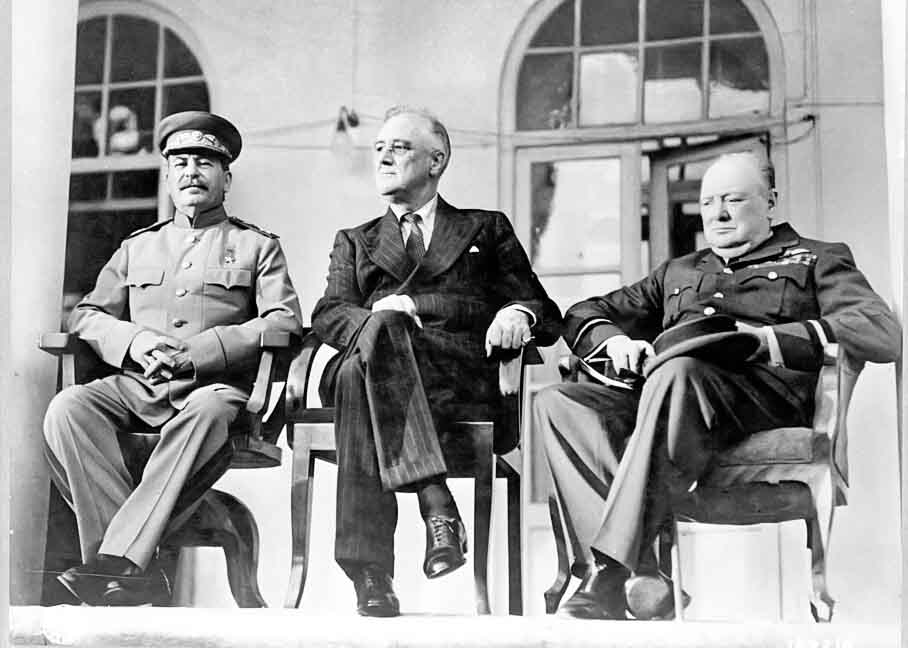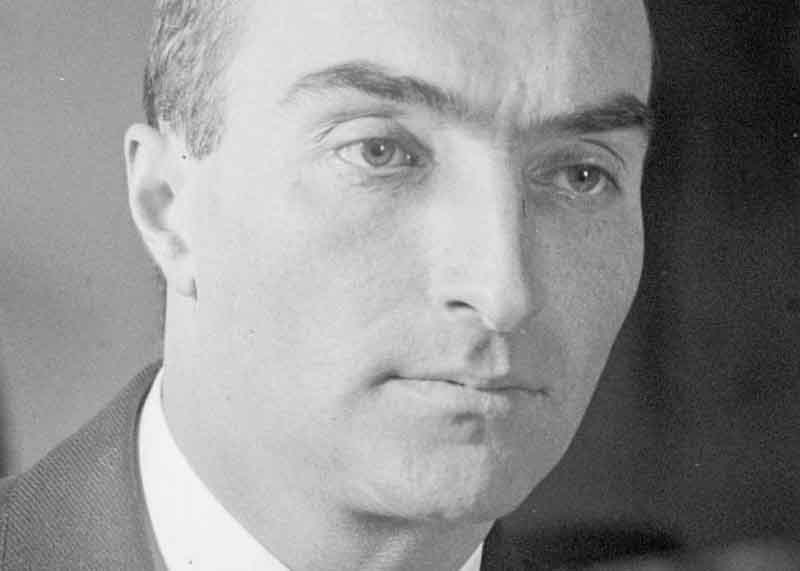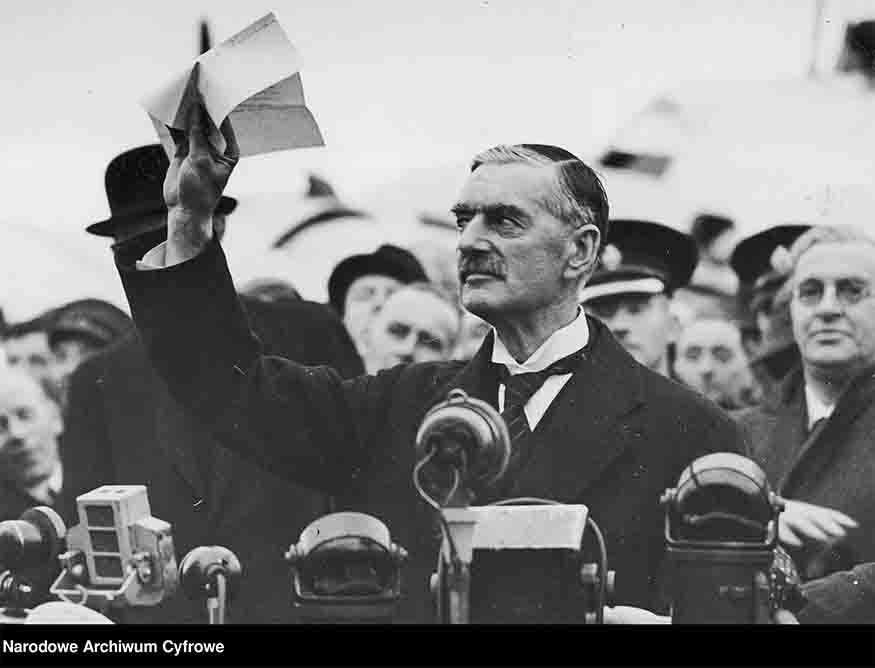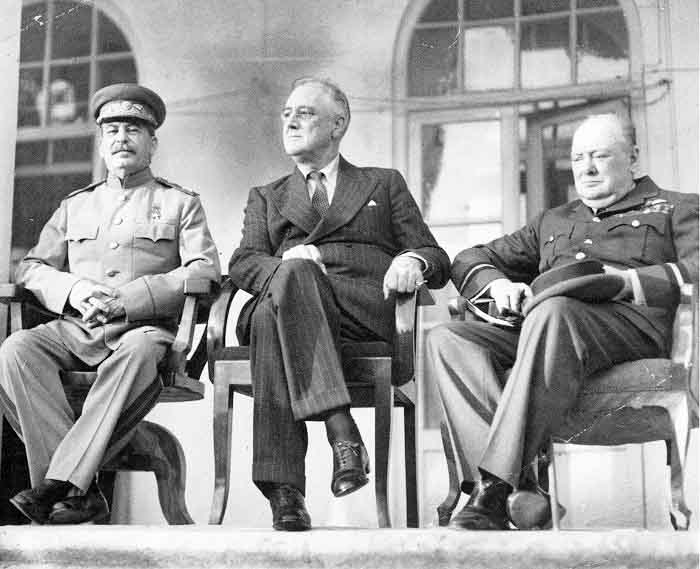The Tehran Conference was a meeting of the leaders of the anti-Hitler coalition (the so-called Big Three): US President Franklin Delano Roosevelt, British Prime Minister Winston Churchill, and USSR leader Joseph Stalin in Tehran, on November 28 — December 1, 1943. (Wikipedia)
It is common knowledge that ultimate decisions about the future of Europe were made in Tehran. One decision was fundamental. The second front against Germany was to be opened in Western Europe, in France — rather than in the Balkans, according to Winston Churchill's concept, to which he did not convince President Franklin D. Roosevelt. This meant that Poland would be "liberated" by the Red Army. What this liberation would look like — the American president and the British prime minister did not say.
Secretly from the Polish Government-in-Exile, a decision was made about the Curzon Line as the eastern border of the Polish state in the east. The territories that the Soviet Union had captured in a tactical alliance with Germany in September 1939 were given to the Soviets to pay them for their contribution to the war against Hitler.
It was decided that defeated Germany would be divided into three occupation zones. It was agreed that the Soviet zone would be demarcated so that access to it would require the Soviets to be provided with lines of communication through Poland, which is the geopolitical "divider" between Russia and Germany. This had a huge significance for the fate of post-war Poland.

"The Big Three" in Tehran, 1943 (Source: Wikipedia)
In Tehran, Stalin achieved a great goal. He didn't give up anything. For the price of consent to the participation of the USSR in the future United Nations, he gained control over Poland and gained domination in the Intermarium Europe. This was not said explicitly in any form, but this was the implied logic of the Tehran Agreement.
However, it is worth saying a few words about the concept of the future Polish state as understood by Winston Churchill. On paper, the British Prime Minister reached agreements that did not in any way undermine his plan to resolve the Polish issue. This plan — let us recall — was summarized in the following theses:
- The "Curzon Line" as the eastern border of the Republic of Poland, in exchange for which the independence of this state would be confirmed.
- Territorial "compensation" to Poland at the expense of Germany's current possessions in exchange for eastern lands.
- Polish state "friendly" to the Soviets.
All this was essentially confirmed in Tehran. And yet, Churchill's plan not only failed, but had no prospect of being implemented already when the Big Three were talking in the capital of Iran.
During the last meeting of the Big Three in Tehran (December 1, 1943), Churchill called the Polish issue "a great problem". He also said: "We declared war on Germany because Germany attacked Poland. I was surprised at the time that Chamberlain did not fight for the Czechs in Munich, and in April 1939 he suddenly gave guarantees to Poland. I was surprised when he rejected better terms and turned to a policy of war. (…) We attach great importance to the reason that led us to enter the war.” These words certainly prove one thing. The British Prime Minister was fully aware of the significant role of the Polish problem for relations within the Grand Coalition and the balance of power in post-war Europe.
Everything indicates that Churchill wanted to save the independence of post-war Poland at the price of territorial concessions in the east, rewarded by the expansion of Polish borders in the north and west, i.e. at the expense of defeated Germany. Did the British Prime Minister believe that satisfying the expansionist aspirations of the USSR would be compatible with the principles of the balance of power, the restoration of which he considered necessary? Did he realize that Poland, incorporated into the Soviet sphere of influence, was at risk of Sovietization? There is no clear answer to these questions. Everything indicates that he rationalized the decisions made, having no confidence in the Soviets' implementation of them.
British Foreign Minister Anthony Eden, returning in his memoirs to the problem of the rationality and correctness of British policy during the Tehran conference, stated that there was no alternative to the actions of his country's government. "Even if our worst fears were correct, we tried not to worsen our situation by trying to cooperate with Russia and assuming that Stalin meant what he said about the Anglo-Soviet alliance," Eden wrote.
It may seem very naive, but Roosevelt left Tehran with the conviction of great success. He obtained consent for the USSR to participate in the group of the "four policemen of the world", i.e. the founding powers of the United Nations (the United States, Great Britain, the USSR, China). The president bought the Soviet dictator's signature as a great prize. He believed — as one can assume — that it marked a turning point in world history. He did not understand that Stalin's criminal state could not be a peaceful actor in international relations.
This is how two Western visions of peace after World War II worked against Poland. The American one reduced everything to the idea of "four policemen of the world", raising this concept to the role of a dogma. Promoted to the role of one of them, the Soviet Union was not interested in anything other than conquest and domination. The British concept was based on the idea of some compromise between the aspirations of the Poles and the aspirations of the Soviets. In fact, no compromise was possible.
There's one more thing to remember. Well, the Tehran agreements were reached in absentia. They were hidden from the Polish government. The ally was treated as if the provisions of the Mutual Assistance Treaty of August 25, 1939, which prohibited making peace commitments without consulting the other side, were not in force. It should be noted, however, that regardless of whether the Polish government in London was informed or not about the Tehran arrangements, Poland's fate was sealed. Of course, the borders of the new Polish state were not established in Tehran, but it was certain that it would not be independent.
The Tehran Conference is a good example of appeasement applied to the Soviets to satisfy their desires and aspirations. The Atlantic Charter was silently trampled on. After Tehran, World War II took on a new face. It ceased to be a war to defend the nations that Germany had conquered, and became a war to realize the spheres of influence of the powers of the anti-Hitler coalition. The first to benefit from this process was the government in Moscow.
Historians' disputes about whether there was any other option for the policy of the Anglo-Saxon powers than a new appeasement — this time in favor of the Soviets — are not over. Most maintain that this was the only way to win World War II. This concept must be contrasted with other reasoning. In our opinion, this policy could have been different and did not have to end with such great concessions. In particular, Roosevelt's concept of lasting post-war cooperation between the powers of the anti-Hitler coalition was a great illusion. In shaping Western policy, the decisive voice belonged not to the British government, but to the American one. This was certainly the case at the end of 1943.
Translation from Polish by Andrew Woźniewicz.










